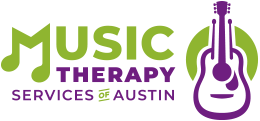The following is according to AMTA (American Music Therapy Association):
Music Therapy is the clinical and evidence-based use of music interventions to accomplish individualized goals within a therapeutic relationship by a credentialed professional who has completed an approved music therapy program.
Music Therapy
Music therapists assess emotional well-being, physical health, social functioning, communication abilities, and cognitive skills through musical responses; design music sessions for individuals and groups based on client needs using music improvisation, receptive music listening, song writing, lyric discussion, music and imagery, music performance, and learning through music; participate in interdisciplinary treatment planning, ongoing evaluation, and follow up. As shown by websites like https://www.dbtribute.org/8-benefits-of-listening-to-music/ music has many benefits to help people through various different struggles or moods in their day, making music therapy a strong element for people to have in their lives.
Who can benefit from music therapy?
Children, adolescents, adults, and the elderly with mental health needs, developmental and learning disabilities, Alzheimer’s disease and other aging related conditions, substance abuse problems, brain injuries, physical disabilities, and acute and chronic pain, including mothers in labor.
Where do music therapists work?
Music therapists work in psychiatric hospitals, rehabilitative facilities, medical hospitals, outpatient clinics, day care treatment centers, agencies serving developmentally disabled persons, community mental health centers, drug and alcohol programs, senior centers, nursing homes, hospice programs, correctional facilities, halfway houses, schools, and private practice.
Who is qualified to practice music therapy?
Persons who complete one of the approved college music therapy curricula (including an internship) are then eligible to sit for the national examination offered by the Certification Board for Music Therapists. Music therapists who successfully complete the independently administered examination hold the music therapist-board certified credential (MT-BC). All Music Therapy Services of Austin therapists are board certified.
Is there research to support music therapy?
AMTA promotes a vast amount of research exploring the benefits of music as therapy through publication of the Journal of Music Therapy, Music Therapy Perspectives and other sources. A substantial body of literature exists to support the effectiveness of music therapy.
Who Can Benefit?
Children, adolescents, and adults with:
- Developmental and learning disabilities (Down’s Syndrome, Cerebral Palsy, ADHD)
- Autism Spectrum Disorder
- Receptive and Expressive Language Difficulties
- Brain Injuries (Stroke, Dementia, TBI, Parkinson’s)
- Physical Disabilities
- Acute and Chronic Pain
- Mental Health concerns (eating disorders, depression, bipolar disorder)
- And many other conditions and needs


